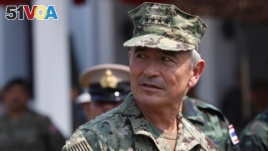May 4, 2017
Speaking before the House Armed Services Committee Admiral Harry Harris, Commander of the U.S. Pacific Command, called North Korea the “most immediate threat to the security of the United States and our allies in the Indo-Asia Pacific”:
“The only nation to have tested nuclear devices in this century, North Korea has vigorously pursued an aggressive weapons test schedule with more than 60 listed missile events in recent years.”
Such tests include a failed missile launch on April 16. North Korea has also ratcheted up rhetoric against the U.S. and its allies. These ongoing provocations are why U.S. President Donald Trump ordered a thorough review of U.S. policy pertaining to North Korea upon assuming office in January.
“In light of the growing threat, the time has come for all of us to put new pressure on North Korea to abandon its dangerous path,” U.S. Secretary of State Rex Tillerson told the UN Security Council:
“I urge this council to act before North Korea does. We must work together to adopt a new approach and impose increased diplomatic and economic pressures on the North Korean regime.”
Secretary Tillerson presented a three-point plan to the UN Security Council, calling for full implementation of already standing resolutions, suspension or downgrade of diplomatic relations, and increasing North Korea's financial isolation.

In an interview with Fox News, Secretary Tillerson explained that China, a major trade partner, has a key role:
“We know that China is in communications with the regime in Pyongyang. They confirmed to us that they had requested the regime conduct no further nuclear test; and in fact, we were told by the Chinese that they informed the regime that if they did conduct a further nuclear test, China would be taking sanctions actions on their own.”
“Our goal is not regime change,” Secretary Tillerson told the Security Council. “Nor do we desire to threaten the North Korean people or destabilize the Asia Pacific region.” He noted, however, that diplomatic and financial levers of power will be backed up by a willingness to counteract North Korean aggression with military action if necessary.
“We much prefer a negotiated solution to this problem,” he said. “But we are committed to defending ourselves and our allies against North Korean aggression.”